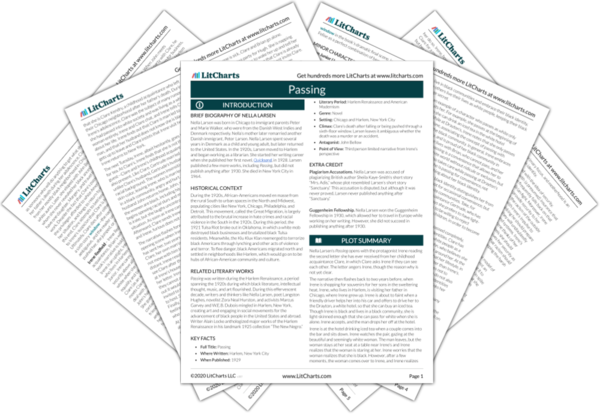Passing offers the reader two different models of motherhood in the characters of Irene and Clare, who each experience parenthood very differently. For Irene, parenting is a kind of security, and an important aspect of her identity. Parenthood offers her a purpose and a way to structure her life. Irene tells Clare that she takes “being a mother rather seriously,” and that she is “wrapped up in [her] boys and the running of her house.” In this respect, Irene shows the reader a more traditional model of motherhood, in which children are a mother’s primary focus, and motherhood is an important aspect of female identity.
Irene associates motherhood with the idea of security. Motherhood provides Irene with (a presumed) insurance that Brian will not leave her, and she frequently falls back on that sense of security when she and Brian fight. Moreover, Irene thinks it is her duty as a parent to provide security to her children, and to insulate them from the racism of the outside world. Brian, meanwhile, disagrees with Irene’s impulse to protect their children from racism, thinking he should prepare his children for life in a country where they will undoubtedly suffer at the hands of racist individuals and systems. Irene’s disagreement with Brian highlights that Irene thinks of her motherhood as security—both in that she feels she should provide security to her children, and that it gives her security as well. Irene seems to see the family as a space that racism should not be allowed to penetrate, even if it means keeping the harsh realities of the world from her children.
Clare, on the other hand, offers a radically different model of motherhood than Irene’s. For Clare, motherhood is not an important aspect of her identity, and rather than using it to structure her life, she tries to find ways to build her life in spite of it. During the same conversation where Irene says that she takes being a mother seriously, Clare asserts that “children aren’t everything,” suggesting that she does not see motherhood as her main purpose. Larsen emphasizes the fact that Clare sees motherhood as a minor part of her life by never actually introducing the reader to Clare’s daughter Margery, keeping her on the sidelines of Clare’s presence in the novel. The lack of importance that Clare places on motherhood shows how she departs from the traditional domestic, maternal female role.
Moreover, Clare often resents her role as a mother, as Margery keeps her from leaving John and returning to her life in the black community. Rather than using motherhood to create a family space insulated from racism, Clare’s motherhood keeps her in a marriage that forces her to suffer racism every day. After Irene reminds Clare that she cannot leave her husband because of what it would mean for her daughter, Clare declares that she thinks motherhood is “the cruelest thing in the world.” What Irene sees as security and responsibility, Clare views as restraint and lack of freedom. Although Irene expresses disapproval for Clare’s version of motherhood, and believes that it is selfish, she also begins to imitate certain aspects of Clare’s version of motherhood. For example, Margery goes to boarding school in Switzerland, and Irene thinks about proposing to Brian that one of their children should go to school in Europe as well.
As with the other aspects of the novel, Larsen does not condemn or valorize either Irene or Clare’s way of being a mother, leaving out moralistic prescription. However, Larsen does seem to be critical of Irene’s sense that her own form of motherhood is more selfless and altruistic than Clare’s, since Irene uses her motherhood as a way to gain control over her life, including her relationship with Brian. This suggests that being a mother, even a devoted mother like Irene, does not necessarily mean being selfless. In fact, Irene’s self-righteous sense of her motherhood as selfless is part of what blinds her to her own manipulations.
Motherhood, Security, and Freedom ThemeTracker

Motherhood, Security, and Freedom Quotes in Passing
It’s awful the way it skips generations and then pops out. Why, he actually said he didn’t care what color it turned out, if I would only stop worrying about it. But, of course, nobody wants a dark child.
“Children aren’t everything…There are other things in the world, though I admit some people don’t seem to suspect it.” And she laughed, more, it seemed, at some secret joke of her own that at her words.
Brian. What did it mean? How would it affect her and the boys? The boys! She had a surge of relief. It ebbed, vanished. A feeling of absolute unimportance followed. Actually, she didn’t count. She was, to him, only the mother of his sons. That was all. Alone she was nothing. Worse. An obstacle.
“I want their childhood to be happy and as free from the knowledge of such things as it possibly can be”….
“You know as well as I do, Irene, that it can’t. What was the use of our trying to keep them from learning the word ‘nigger’ and its connotation? They found out, didn’t they? And how? Because somebody called Junior a dirty nigger.”
Drearily she rose from her chair and went upstairs to set about the business of dressing to go out when she would far rather have remained at home. During the process she wondered, for the hundredth time, why she hadn’t told Brian about herself and Felise running into Bellew the day before, and for the hundredth time she turned away from acknowledging to herself the real reason for keeping back the information.
















